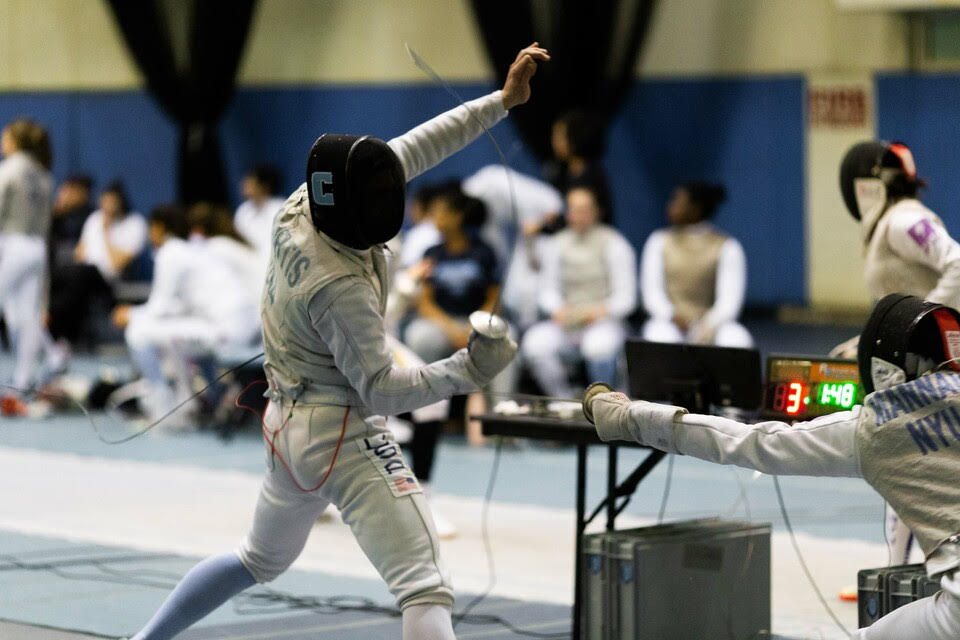Never Alone: Columbia Fencing’s Team Mentality
Columbia men’s and women’s fencing both took home Ivy League Championship titles last weekend, relying on a system of team work and living by the words that individual fencers are “never alone.” (Ben Goldsmith)
Every bout begins with a fencer connecting their body cord —an electrical cord that runs down a fencers arm and out the back of their jacket—to a reel situated at the end of the strip. It’s a tedious and awkward process, with one end of the body cord plugged into the reel and the other into the fencer’s weapon. The reel is connected to the scoreboard so it registers when a fencer scores a touch.
While at the George Kolombatovich Memorial Meet, hosted by Columbia on February 13 in the Dodge Fitness Center, I saw fencers complete this task hundreds of times. While the NYU, Vassar, and Sacred Heart fencers often performed the ritual themselves, a Columbia fencer never did it alone. Before or after every bout, there was a teammate (or four) at the end of the strip to offer advice, a high five, and a hand.
This may not seem like much, but in a sport that can often seem solitary, Columbia fencing makes it seem anything but.
This culture of comradery is the work of head coach Michael Aufrichtig. Aufrichtig inherited a Columbia team that was 12–25 when he arrived in 2011 but has since won ten Ivy titles—six mens’ and four women’s—and two NCAA team titles during his tenure.
The fencing season is long and the athletes are constantly travelling, competing in weekend-long “super meets” in the United States and against top competitors in World Cup competitions around the globe.The season, however, boils down to two main moments of competition: first,the Ivy League Championships, and second, the NCAA Championships.
Developing a strong team dynamic isn’t always easy when your program attracts top players who often have their sights set on individual World Cup Championships and qualify for the Olympics. Because of this, on any given weekend, Columbia fencing may not be operating at full force. Aufrichtig has made it clear, though, that when there’s a chance for everyone to win, the team is top priority.
“When there is a conflict with Ivy Championships and maybe a World Cup, the team comes first” Aufrichtig said. “We had some women epee fencers and women foil fencers not go to a World Cup—which could affect their qualifications on some teams—to go to the Ivy championships.”
It’s a delicate balance between nurturing the goals of the individual fencer and putting the team first. This is perhaps best exemplified by the Columbia women’s foil squad.
The small squad is led by senior captain Quinn Crum (CC ’19) and consists of senior Iman Blow, (CC ’19) sophomore Sylvie Binder (CC ’21), and junior Ester Schreiber ( BC’20). Blow took home the 2018 NCAA women’s foil title last spring. Binder won the individual women’s foil competition at Ivy League Championships last weekend, making her a two-time champion in the event. Schreiber, a Swedish national, competes for her country on the world stage. Crum is a veteran Ivy League Champion, having competed and won the title multiple times during her four years on the team.
Each woman has incredibly lofty yet achievable personal goals—goals apart from their journey at Columbia. But when Aufrichtig asked each squad to come up with a “tattoo” of a phrase that represents them and what drives them, the women’s foil squad produced two words: “Never Alone.”
The tattoo would be something the women could look to over the course of the Championship meet when they needed a pick-me-up, a reminder of what they were fighting for.
The sentiment of these words, representing the constant support of a team, drove Binder as she competed in a tense bout against Princeton at the Ivy Championships. Fencing matches consist of 27 bouts, the winner taking at least 14 of them. Princeton is one of the top teams in the Ivy League, and when Binder took to the strip on Saturday afternoon, she was fencing the pivotal 14th bout.
“Going into it, my teeth are chattering” said Binder. “I’m like, ‘Oh no, I don’t want to lose this for my team!’”
The nerves are to be expected. Any athlete—any person—would be able to understand the pressure she must have been under. Anyone would also understand her ensuing feeling of euphoria when she secured the victory.
“When I scored the fifth touch everyone rushed onto the strip…. It felt like so much more than winning a five-touch bout because it was about the entire team.”
Team—that’s what Binder was focused on. Despite winning the Individual Women’s Foil Ivy League Champion title, Binder recounts this story of the 14th bout against Princeton when asked about defining moments of the tournament.
It’s what Aufrichtig is focused on too, and that’s not because there aren’t individual awards to be touted. Six male and three male Columbia fencers were named to All Ivy teams this past weekend, Binder picked up her individual title, and Aufrichtig himself was named Ivy League women’s fencing coach of the year. Of course, these are all tremendous honors. But at the end of the day, they aren’t what matter.
“When the whole team can win, it’s important,” said Aufrichtig. “Everyone gets a ring when we win Ivies.”

